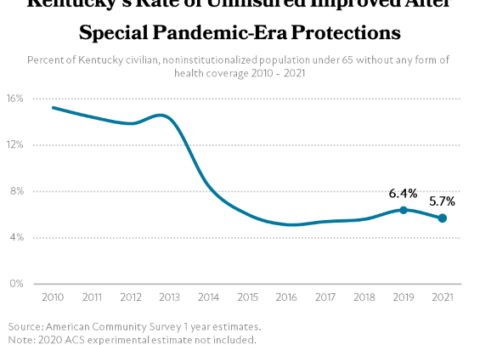More than 10,000 Kentuckians have lost food assistance in recent months as a result of the state’s decision to expire time limit waivers for some Supplemental Nutrition Assistance Program (SNAP) participants. A new report from the Kentucky Center for Economic Policy (KCEP), “Time Limits and Other Challenges Hinder Success of Kentucky’s SNAP E&T Program,” shows the state’s recent expansion of the SNAP Education and Training program (SNAP E&T) is an inadequate response. Though the program is meant to give people now subject to the time limit the ability to keep food assistance in the short term and to improve their economic mobility in the long term, it provides too few people with too little opportunity.
“There are barriers to food security and economic security on all sides of this situation that the state has helped create,” KCEP Senior Policy Analyst and author of the report, Dr. Ashley Spalding said. “We’ve made it harder for people to keep food assistance, and while giving lip service to SNAP E&T as an alternative for those who struggle to overcome the time limit, we’ve failed to make sure they can access the program.”
As the report explains, now that time limit waivers have been allowed to expire across 112 Kentucky counties, adult SNAP participants without dependents or disabilities who have received food assistance for 3 months must document 80 hours of work a month to keep SNAP benefits. Many of these individuals are already working, but in sectors providing unsteady employment with unpredictable hours. And many live in areas with chronic job shortages and face other barriers to employment related to systemic racism, health and transportation issues, having a felony record, or having limited education.
For people who struggle to meet the work requirement for these and other reasons, participation in a SNAP E&T program can enable them to keep food assistance. It’s also supposed to help people become economically secure, but as the report explains:
- SNAP E&T in Kentucky is difficult to access with few training opportunities across the state. For instance, many counties do not have a Kentucky Career Center (KCC) offering E&T services including initial intake assessments for the program.
- There are not enough supports to address the barriers many face to participation in E&T. For example, participants receive a maximum of just $25 a month through the KCCs for transportation while they are in E&T, yet sometimes must cross counties multiple times a month to meet program requirements.
- The design of Kentucky’s SNAP E&T program is not focused enough on skills or career pathways to meaningful jobs, and has too much of a “work first” focus instead. As a result, participants are steered into low-wage jobs rather than equipped for upward mobility through high-quality, skills-focused training.
“SNAP E&T fails at being a stopgap for the tens of thousands of Kentuckians who have either lost or are at risk of losing their food assistance,” said Spalding. “And it does not truly equip people to move beyond low-wage, low-quality, unstable jobs. In addition, taking away food assistance from people who face substantial barriers to economic security could actually force them deeper into poverty.”
Several changes to Kentucky’s SNAP E&T program are underway for 2019 that could lead to increased participation and better employment outcomes for some low-income Kentuckians. However, the proposed changes are inadequate to stem the tide of Kentuckians losing food assistance. The report recommends reinstating time limit waivers in areas facing economic challenges, increasing the quality and availability of E&T services, and providing more robust program supports to participants – policies that should be a part of a broader approach to reducing poverty that includes, for instance, a much-needed boost in the state minimum wage, improved college affordability and felony expungement.
“Reinstating SNAP time limit waivers across the state and making improvements to the E&T program are the least we can do to protect economic security for Kentuckians with low incomes,” said Spalding. “It’s time the state end its attack on safety net programs that help folks who face barriers to well-being such as chronic health issues, discrimination, and too few and low-quality jobs in their communities.”

